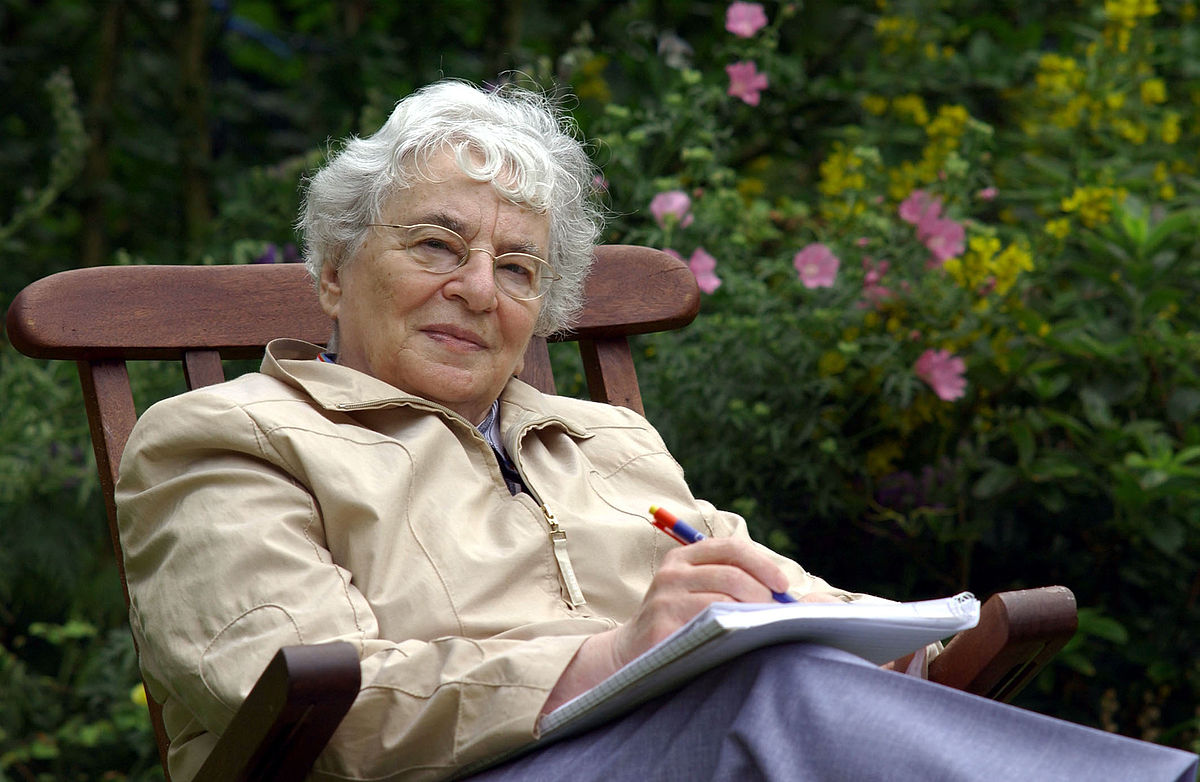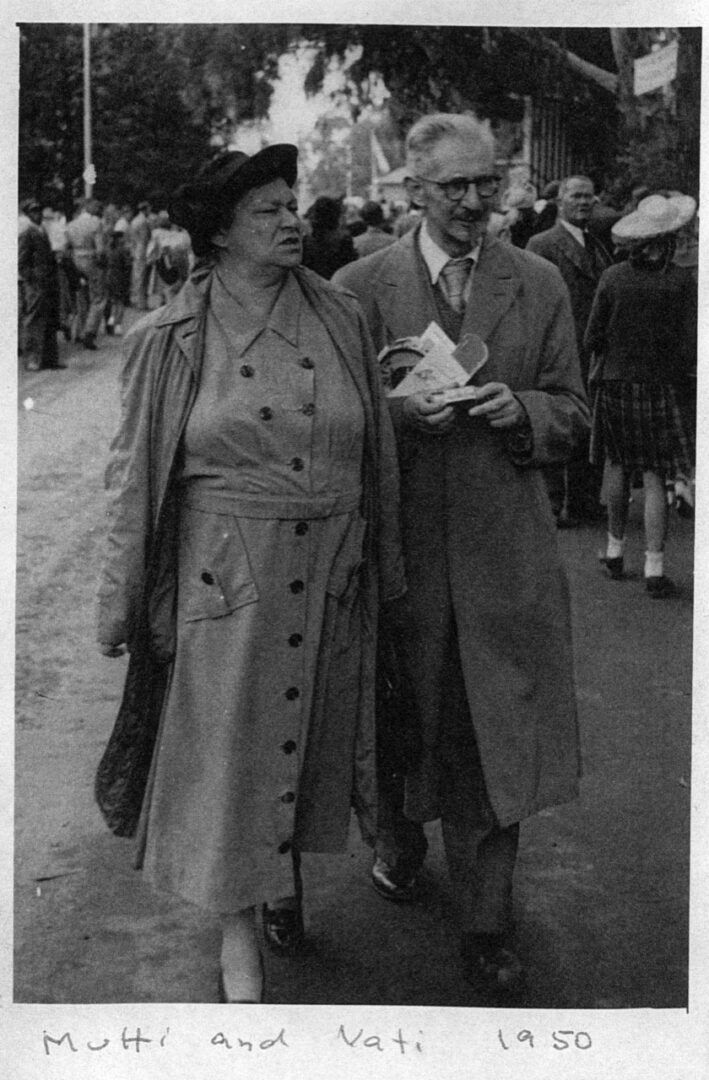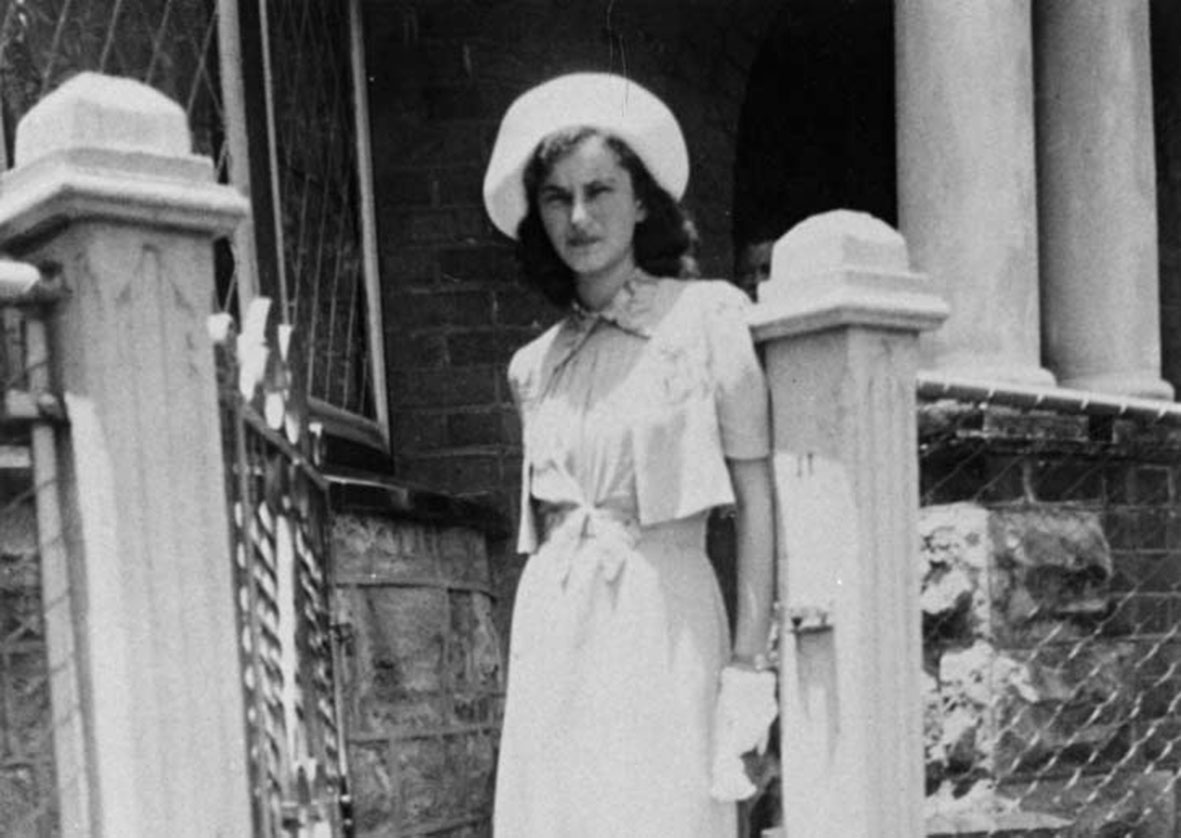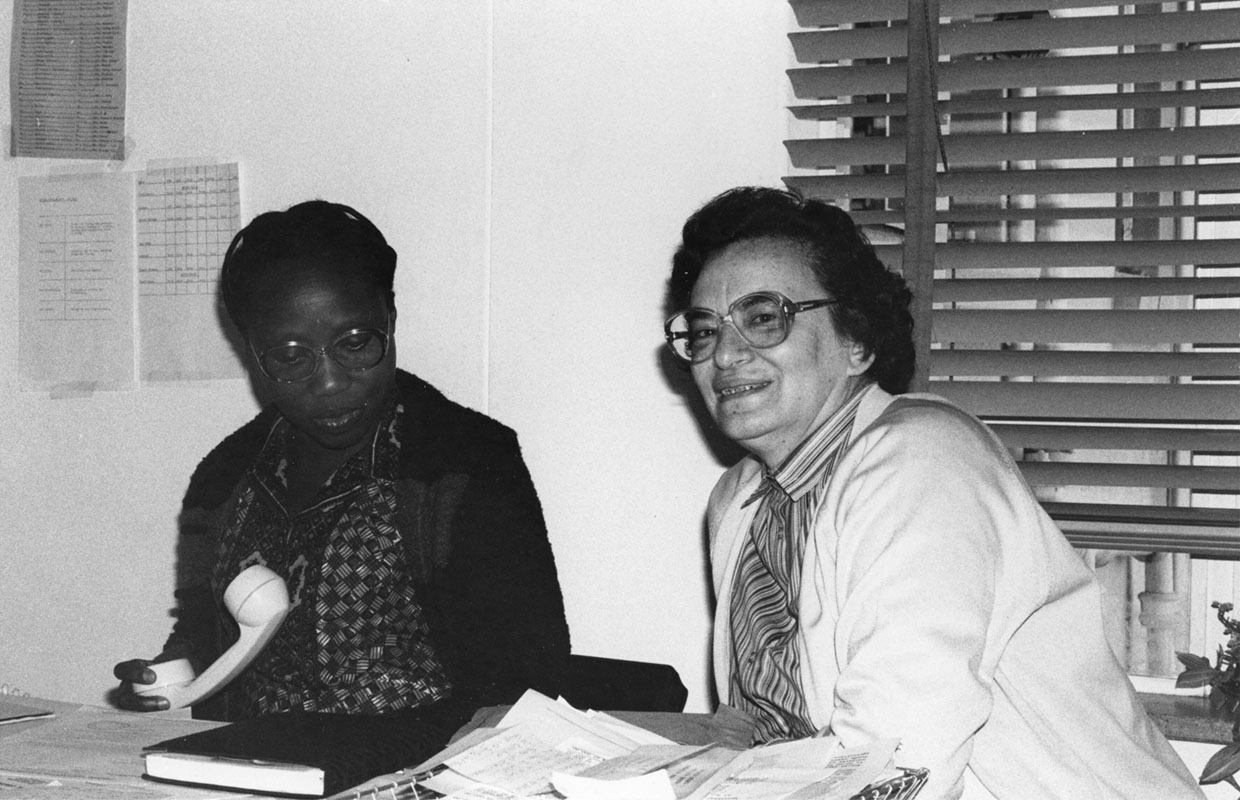Read more:
Nationality at birth: German
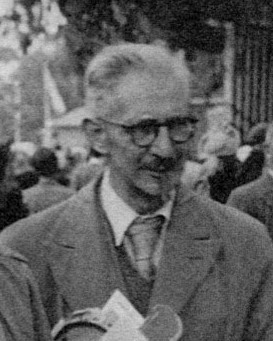 Father
Father
Richard Löwenthal
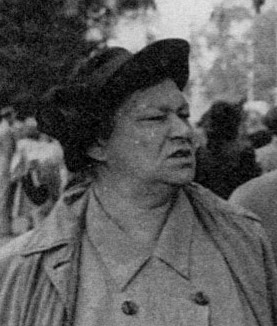 Mother
Mother
Selma Cohen
Margot Löwenthal
Place of the fight for human rights: Johannesburg, Salisbury/Harare, Lusaka, London, Cologne and Lüdinghausen
| Area | Type | From | To | Location |
|---|---|---|---|---|
| Elementary School Rückersdorf | Rückersdorf, Germany | |||
| Israelite Secondary School Fürth | Fürth, Germany | |||
| Mayfair Intermediary School | Johannesburg, South Africa | |||
| Parktown Girls Highschool | Johannesburg, South Africa | |||
| Bookseller | ||||
| Clerk in a Law Firm | ||||
| General Manager in an Insurance Company | ||||
| Economic Journalist for various newspapers | South Africa, Southern Rhodesia, Zambia, Great Britain and Germany | |||
| Lecturer in Economic Journalism |
Ruth Weiss spent her entire life campaigning against human rights violations and antisemitism. She wrote courageously against the structural racism in the apartheid regime, which disregarded human dignity and human rights of the non-white majority in every respect and criminalized any criticism. Her involvement in the Independent Cultural Association, an association of German Jewish emigrants in Johannesburg, reinforced her political analyses. The apartheid regime declared her as persona non grata and thus forced her to go abroad.
Location:Reason for entry:
Function / Activity:
Leitmotif
Ruth Weiss became known for her critical journalistic work during apartheid and during and after the political independence of many African states. She also speaks out clearly against antisemitism as a contemporary witness, including as a speaker in schools and at public events.
How did the story become known?
Her critical reports brought her to the attention of the apartheid regime, the anti-apartheid movement and solidarity groups during the struggle for independence in Zimbabwe. Since then, she has been appreciated as a long-standing expert on the political structures and developments in southern Africa.
When did the story become known?
Since the 1960s, Ruth Weiss criticised the apartheid regime and subsequently the racist settler government in neighbouring Southern Rhodesia.
Where did the story become known?
Ruth Weiss became known as a critical voice in the apartheid state and in southern Africa as well as in Western Europe, especially in Britain and the Federal Republic of Germany.
By whom did the story become known?
Ruth Weiss’ reports and background analyses became known through the national and international press for which she wrote and worked.
Prizes, Awards
In 2005, Ruth Weiss was nominated for the Nobel Peace Prize as one of the 1000 Peace Women.
In 2007 she was awarded the Golden Clover Leaf of the city of Fürth.
In 2010, the state secondary school for girls in Aschaffenburg was named after Ruth Weiss and has since been called the Ruth Weiss Secondary School (“Ruth-Weiss-Realschule”).
In 2014, a special exhibition about Ruth Weiss was shown at the South African Jewish Museum in Cape Town. The title was: “My very first question to you.”
On 12 December 2014, Ruth Weiss received the Federal Cross of Merit 1st Class of the Order of Merit of the Federal Republic of Germany. She was thus honoured for her decades of commitment against apartheid and racism.
On 11 December 2019, Ruth Weiss received the Honorary Award of the German Africa Foundation.
On 24 March 2022, the Queen of Saba Rose was planted in the garden of the South African Embassy in Berlin in honour of Ruth as a fighter against racism.
On 15 September 2022, Ruth Weiss received the “Ovid Prize” in Nuremberg for her life’s work as a writer , which is awarded by the Centre for German-language Authors Abroad EXIL PEN. The ceremony was held in the hall where the Nuremberg Trials had taken place. On 8 June 2020, Ruth Weiss was appointed Honorary President of the PEN Centre of German-speaking Authors Abroad. This is in recognition of her journalistic work and her literary work, her commitment against racism and anti-Semitism, as well as her lectures and talks, including at German schools.
On 30 August 2022, Ruth presented her novels on Jewish history in Germany at the Germania Judaica Library in Cologne and discussed the prevention of antisemitism with the audience.
On 20 September 2022 Ruth Weiss spoke as a contemporary witness at the Jewish Museum in Berlin.
On 19 September 2022, Ruth Weiss met with Seyran Ates at the Ibn Rushd – Goethe Mosque in Berlin for a peace discussion. They explained “Peace in Diversity”. Both speakers were among the “1000 Peace Women” nominated for the Nobel Peace Prize in 2005.
On 27 January 2023, Holocaust Remembrance Day, Ruth Weiss spoke at the North Rhine-Westphalia state parliament in Düsseldorf on the occasion of a commemoration by the state parliament and state government of the liberation of the Auschwitz-Birkenau concentration camp.
On 28 April 2023 in Pretoria (Tshwane, South Africa), South African President Cyril Ramaphosa awarded Ruth Weiss the national order “Companions of O.R. Tambo”. This was in recognition of her contribution to the liberation struggle.
Own works
Publications by Ruth Weiss (Selection)
Publications – Englisch
- South Africa, The Economic Factor – London, 1974
- Strategic Highways of Africa (with G. Arnold) – London, 1977
- The Women of Zimbabwe – London, 1986
- Introduction to Economic Reporting – Harare, 1987
- Zimbabwe and the New Elite – London, 1994
- Sir Garfield Todd and The Making of Zimbabwe, with Jane Papart – London, 1998
- Peace in their Time, War and Peace in Northem Ireland and Southern Africa – London, 2000
Publications – German
- Lied ohne Musik (Autobiographisches), Laetare Verlag, 1980
- Frauen gegen Apartheid (Sachbuch), Rowohlt Verlag, 1980
- Die Frauen von Zimbabwe (Sachbuch), Frauenbuchverlag, 1983
- Afrika den Europäern (mit H. Meyer) (Sachbuch), Peter Hammer Verlag, 1984
- Wir sind alle Südafrikaner (Sachbuch), EB Verlag, 1986
- Mandelas zornige Erben (mit Hannelore Oesterle, Sachbuch), Peter Hammer Verlag, 1986
- Die Saat geht auf (Sachbuch), Peter Hammer Verlag, 1987
- Feresia (Kinderbuch), Peter Hammer Verlag, 1988
- Menschen werfen Schatten (Sachbuch), Peter Hammer Verlag, 1989
- Wege im harten Gras (Autobiografisches), Peter Hammer Verlag, 1994
- Sascha und die neun alten Männer (Kinderbuch), Peter Hammer Verlag, 1997
- Geteiltes Land (Sachbuch), EB Verlag, 1997
- Reise nach Gaborone (Kurzgeschichten), Komzi Verlag, 1997
- Nacht des Verrats (Krimi), Horlemann Verlag, 2000
- Meine Schwester Sara (Roman), Maro Verlag, 2002, dtv, 2004
- Blutsteine (Roman), Maro Verlag 2003
- Der Judenweg (Roman), Mosse Verlag, 2004
- Die Nottaufe (Roman), Mosse Verlag, 2006
- Mitzis Hochzeit (Roman), Maro Verlag, 2007
- Miss Moores Geburtstag (Krimi), Trafo Verlag, 2008
- Eingeladen war ich nicht. Gedanken während einer Reise (Sachbuch), Trafo Verlag, 2008
- Der Judenweg, Die Löws – eine jüdische Familiensaga in Deutschland. Band 1, (Roman), Trafo Verlag (Neuauflage, Verlag Edition AV 2020)
- Die Nottaufe, Die Löws – eine jüdische Familiensaga in Deutschland. Band 2, (Roman), Trafo Verlag (Neuauflage, Verlag Edition AV 2020)
- Der Aufstieg / Des Hoffaktors Kinder, Die Löws – eine jüdische Familiensaga in Deutschland. Band 3, (Roman), Trafo Verlag 2008
- Der Niedergang, Die Löws – eine jüdische Familiensaga in Deutschland, Band 4, (Roman), Trafo Verlag 2008
- Memory. Ein afrikanisches Tagebuch, (Roman), Trafo Verlag 2008
- Beichte eines Kunstfreunds oder Wie entsorge ich meine Familie, (Roman), Trafo Verlag 2008 (Neuauflage, Verlag Edition AV 2022)
- Deborahs Lied (Roman), Trafo Verlag 2010
- Miss Moore’s Hausparty (Roman), Trafo 2010
- Analyse des Projektes Zimbabwe Institute for Southern Africa, ZISA, 1987-1993, Harare, Kurzbericht, Weltfriedensdienst Berlin 2010.
- Schwere Prüfung, Die Löws – eine jüdische Familiensaga in Deutschland, Band 5, (Roman), Verlag Edition AV, 2018
- Nachspiel, Die Löws, eine jüdische Familiensaga in Deutschland, Band 6 (Roman), Verlag Edition AV 2019.
- Die Mischpoke, Kurzroman/Nachwort, Die Löws, Band 7, Verlag Edition AV 2020/21.
- Der spitze Hut (Roman), Verlag Edition AV 2020
- Der jüdische Kreuzfahrer, (Roman), Verlag Edition AV 2022
Even as a child, Ruth Weiss had to endure politically motivated and heightened antisemitism in German society. This affected her everyday school life and her way to school. After going into exile in South Africa, Ruth rejected the society-shaping racism of the whites in South Africa, many of whom were also antisemitic.
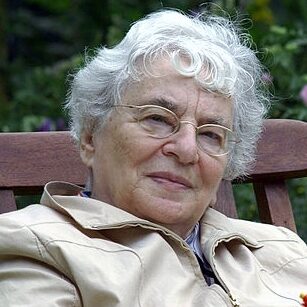
INTRODUCTION
Ruth Weiss, who had to flee with her family from Nazi terror, courageously wrote about the racist apartheid government and the equally repressive Smith regime in Southern Rhodesia, South Africa’s neighbour, which violated UN sanctions. Ruth Weiss was deported from Southern Rhodesia because she regularly reported on the circumvention of sanctions there. In addition, as a journalist, she informed about human rights violations. After the political independence of Zimbabwe, which emerged from the former settler colony of Southern Rhodesia in 1980, she was not sparing in her criticism of the post-colonial autocratic government under Robert Mugabe, which placed the preservation of power by all means above international and regional human rights obligations, although it had committed itself to respecting them. As a contemporary witness, speaker and as an author of non-fiction books and novels, Ruth Weiss makes a great contribution to reducing antisemitism, which is once again gaining popularity and was never overcome.
THE STORY
Ruth Weiss was born in Fürth, Germany on 26 July 1924 to Jewish parents with the surname Löwenthal. From 1927 to 1931 the Löwenthals lived in Hamburg, then they moved to Rückersdorf near Nuremberg and two years later back to Fürth. During their childhood, Ruth and her sister were personally affected by the politically motivated and heightened antisemitism in German society. They were ostracised by teachers at school and mobbed by other children in the street. Their father lost his job in 1933 because of antisemitic personnel policies and resulting dismissals. He went into exile in South Africa, his wife and daughters followed him in 1936.
Early on, Ruth was confronted with the antisemitism of white South African fascists and the racism that shaped society during her first encounters in a white working-class residential area in the industrial metropolis of Johannesburg. For poor white women in Johannesburg acted with a contemptuous ‘master race’ attitude towards Black domestic workers. Ruth observed this very carefully as a child and later wrote about it. This included her book “Black Women Against Apartheid”, which was blacklisted by the racist apartheid government. Ruth Weiss also analysed patterns of behaviour between women of different origins and skin colour in her speeches as a contemporary witness as an example of structural racism problems in South Africa.

Abb. 2: Ruth Weiss in front of her family home 1941
Also on her way to school in Johannesburg, Ruth observed how racist and arbitrary harassment by police officers shaped the everyday lives of Black men and humiliated them as human beings. Black migrant workers were only tolerated temporarily in the cities and had to identify themselves constantly. Those who could not prove their employment during police checks were arrested. Such everyday observations shaped Ruth’s sense of injustice and justice.
After graduating from high school, Ruth first worked as a clerk in a law firm, and from 1944 for four years in the bookshop of her husband Hans Weiss, who was also active as a journalist. She took on research trips for him, for example to Tanganyika, later Tanzania. That was the prelude to numerous (research) trips on the continent – over decades on her own. She worked for a publishing house in London for two years. This was followed by several years as an authorised signatory for an insurance company. She worked for this company for a total of 11.5 years.
But she found her professional fulfilment in journalism. In 1960 she became Business Editor at News Check in Johannesburg and in 1965 she switched to the Financial Mail. In 1966, she was put under pressure by South Africa’s repressive minority government because of her criticism of apartheid and was classified as persona non grata. She first went to London and was then sent by the Financial Mail to Southern Rhodesia to open an office of that newspaper in the capital Salisbury (now Harare), which she ran until 1968. There, too, she came into conflict with the racist white settler regime, which did not tolerate her critical reports on human rights and reacted by expelling her from the country/ deporting her.
Ruth Weiss then wrote for The Guardian and the Investors Chronicle in London. In 1971, she moved to Lusaka and worked as Business Editor at the Times of Zambia and as Zambia correspondent for the Financial Times. This was followed by a three-year management assignment as Chief of Service in the Africa editorial department of Deutsche Welle in Cologne (1975-1978) and subsequent freelance work in London.

Abb. 3: Ruth Weiss and Sally Mugabe, 1982
From 1982 onwards, she helped to establish the training of business journalists at the Polytechnic in Zimbabwe’s capital Harare – the country had become politically independent in 1980 – and worked for the Zimbabwe Mass Media Trust. From 1988, Ruth Weiss helped to found the Southern African Economist (SADCC Press Trust) there. This was followed in 1987 by the establishment of the Zimbabwe Institute for Southern Africa (ZISA) of the Cold Comfort Farm Trust – also in Harare. This institute, for which Ruth Weiss worked with Moeletsi Mbeki, the brother of the later president Thabo Mbeki, organised secret, confidence-building talks between representatives of the apartheid government and the anti-apartheid organisations. However, ZISA did not interfere with the content, it provided background information in the form of fact sheets for presidents of frontline states, i.e. the “movers and shakers” in Southern Africa – the later SADC.
Ruth Weiss had already met Nelson Mandela in 1960.
When the African National Congress (ANC) got into a bloody conflict with the Inkatha Freedom Party (IFP) during the negotiation processes for a democratic South Africa – Inkatha tried to instigate a civil war with the help of the South African police and other security forces, especially in townships around Johannesburg and in various areas in KwaZulu-Natal – Ruth Weiss was a member of a delegation of the ecumenical World Council of Churches (WCC) who wanted to bring about peace.
Already while working in the private sector, Ruth Weiss devoted herself to journalistic writing, which was also due to her marriage to the journalist Hans Weiss. In addition to her multi-year employment contracts for various international newspapers and broadcasters, she worked freelance for numerous other media. These included African Contemporary Record, African Business, Africa, Gemini News Service, BBC, the Weekly Newspaper (WOZ) and publications of Swiss solidarity groups with Southern Africa. She was honorary president of the small anti-apartheid movement in Switzerland.
After an interlude on the Isle of Wight from 1992, she moved to North Rhine-Westphalia in 2002 and has lived with her son and grandson in Denmark since 2015.
Ruth Weiss has written numerous non-fiction books, novels, thrillers and children’s books, especially in retirement, publications in both German and English. Some of her books for children and young adults have won book prizes. Thematically, her work deals with racism and politics in southern Africa and worldwide antisemitism, with the author focusing on Germany, other European countries and South Africa. In addition, she has written magazine and newspaper articles as well as blog posts, many of which appear on her own blog.
The novel for young people “My Sister Sara” (2004), was compulsory reading for the final exam at all secondary schools in Baden-Württemberg in 2007 and 2017/18. It was the only book to be selected twice for this and thus reached many young people.
Ruth Weiss is committed to reconciliation and peace. Since the 1990s, talks with contemporary witnesses and reading tours have taken her to schools in all of Germany’s federal states.
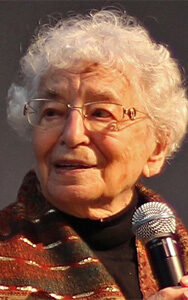
Abb. 4: Ruth Weiss 2021
Author: Rita Schäfer
Contact: schaefer-afrika@posteo.de
Images:
- Header and portrait image: Ruth Weiss (2005), CC0
- Fig. 1: Courtesy of Ruth Weiss Gesellschaft
- Fig. 2: Courtesy of Ruth Weiss Gesellschaft
- Fig. 3: Courtesy of Ruth Weiss Gesellschaft
- Fig. 4: Courtesy of Ruth Weiss Gesellschaft
Sources and further literature:
Ruth Weiss
https://ruthweiss.net/german-blogs/
https://ruth-weiss-gesellschaft.de/
Interviews with and features about Ruth Weiss
https://www1.wdr.de/mediathek/audio/zeitzeichen/audio-ruth-weiss-journalistin-geburtstag–100.html
https://www.dw.com/de/ruth-weiss-2019-ist-von-1930-nicht-sehr-weit-entfernt/a-48316530-0
https://www.swr.de/swr2/leben-und-gesellschaft/ruth-weiss-audio-swr2-zeitgenossen-100.html
https://www.landtag.nrw.de/home/mediathek/video.html?kid=335b3558-8e9e-4cec-9469-0000002193C8
https://www1.wdr.de/nachrichten/landespolitik/holocaust-gedenktag-landtag-nrw-100.html
https://www.woz.ch/0833/holocaust/seit-wann-sind-sie-juedin
https://www.hr2.de/podcasts/literaturland-ovid-preis-ruth-weiss,audio-73110.html
https://www.youtube.com/watch?v=-YYEg92FvrA
https://www.youtube.com/watch?v=4urxm5TLOA4
https://www.youtube.com/watch?v=b5YV4RvScv0
https://www.youtube.com/watch?v=j6RTMfl58T0
https://www.youtube.com/watch?v=he53_JTNc2Y
https://www.youtube.com/watch?v=vkQgiVCZhps
https://www.youtube.com/watch?v=db0KxapQ-M0
https://www.youtube.com/watch?v=e2rUpfI9ECM
https://www.youtube.com/watch?v=–DdElTlnKg
https://www.youtube.com/watch?v=7VTYbA7vlQA
https://www.youtube.com/watch?v=WW4joWDnn7I
https://www.youtube.com/watch?v=QkxatyVAuDc
https://www.youtube.com/watch?v=o0eP8fKdnBc
Biography, Ruth Weiss Exhibition and Archive
https://de.wikipedia.org/wiki/Ruth_Weiss_(Journalistin,_1924)
http://cjc.org.za/ruth-weiss-exhibition-at-sa-jewish-museum/
https://www.fuerthwiki.de/wiki/index.php/Ruth_Weiss
https://memoriav.ch/projects/basler-afrika-bibliographien/
https://www.woz.ch/1551/rebellinnenraetsel/die-antirassistin-mit-der-schreibmaschine
https://www.dw.com/de/ruth-weiss-eine-deutsch-afrikanische-jahrhundertzeugin/a-17912539
Awards
https://vimeo.com/822125548/12d333697d
https://www.youtube.com/watch?v=L0Y3VXZDOHA
https://museenblog-nuernberg.de/2022/07/26/98-geburtstag-ruth-weiss/
https://www.youtube.com/watch?v=lx8bKNvrIuY&t=439s
https://blog.dnb.de/laudatio-auf-ruth-weiss/
https://exilpen.org/ovid-preis/
https://taz.de/Anti-Apartheids-Aktivistin-erhaelt-Auszeichnung/!5931492/
https://www.frauennetzwerk-fuer-frieden.de/verein/ehrenmitglieder/105-ruth-weiss.html
https://ruthweiss.net/blog/nomination-for-2005-nobel-peace-prize/
Ruth Weiss: Jewish History and Culture
https://www.antisemitismusbeauftragte.nrw/de/gedenkstunde_27_Januar_2023
https://www.juedische-allgemeine.de/kultur/judentum-heisst-waerme/
https://www.juedische-allgemeine.de/unsere-woche/weltbuergerin-aus-fuerth/
https://www.juedische-allgemeine.de/kultur/auszeichnung-fuer-eine-heimatlose/
https://www.juedische-allgemeine.de/allgemein/mandelas-weisse-schwester/
https://www.stadt-muenster.de/kulturamt/literaturline/ruth-weiss
https://www.aviva-berlin.de/aviva/content_Interviews.php?id=13221
https://www.woz.ch/0519/ruth-weiss/loews-karriere
South Africa
https://zeithistorische-forschungen.de/2-2016/5374
https://www.woz.ch/0948/medienfreiheit-in-afrika/mit-leeren-spalten
https://www.woz.ch/1234/suedafrika/ein-massaker-wie-zu-zeiten-der-apartheid
https://www.woz.ch/1250/suedafrika/zwoelf-kuehe-fuer-zuma
https://www.woz.ch/1350/nelson-mandela-1918-2013/am-ast-eines-baumes-ziehen
https://www.woz.ch/1227/suedafrika/wie-radikal-solls-denn-sein
https://www.juedische-allgemeine.de/politik/sorge-um-mein-suedafrika/
https://www.juedische-allgemeine.de/kultur/abschied-von-madiba/
Zimbabwe
http://www.afrikakomitee.ch/rundbrief-vereinigung-schweiz-zimbabwe/
https://www.woz.ch/1329/simbabwe/mugabe-zieht-in-die-letzte-schlacht
https://www.woz.ch/1148/simbabwe/verantwortung-ohne-macht
https://www.woz.ch/0715/simbabwe/neue-regeln-altes-unrecht
https://www.woz.ch/0511/simbabwe/mit-leerem-bauch
Zambia
https://www.woz.ch/1009/sambia/kaunda-kam-im-kampfhemd
Peace Building
https://ruthweiss.net/blog/nomination-for-2005-nobel-peace-prize/
School visits – Ruth Weiss in conversation with students and teachers
https://www.youtube.com/watch?v=c-FkOiKYkKo
https://www.youtube.com/watch?v=GXr1L3BPFWk
https://www.youtube.com/watch?v=5zxzsgR-zZI
All links: last retrieved on 18.07.2023




